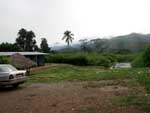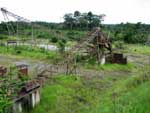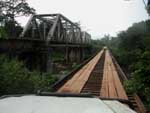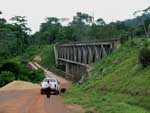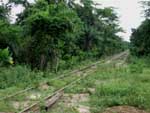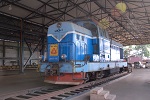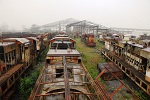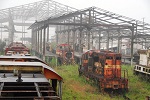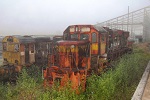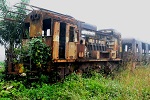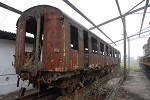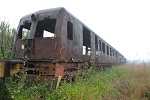1986
During 1986 I get my first job on working the fuel train. Idle down to Buchanan on Sunday morning and prepare the SW900 switcher locomotive. Next the fuel tank is picked up along with the fueling crew. One guy had all the keys to provide access to the stations, doors and filler pits, covered by big steel doors. So off we go, someone had told me this was a long job, you may not have enough time to fuel all the stations. We arrive at the first station, Mokra Town, spot the fuel tank alongside the filler, what I could not understand was the crowd of people waiting for us to arrive, men with cans, women with bowls, kids, babies, dogs, the people from all around knew we were coming.
The Liberian foreman gets his keys and opens the door to the cabin, I was curious to look inside the engine house, so I followed him in. The room was clean & tidy, there were two diesel engines side by side, one purring away, with an air conditioner on the wall to keep the temperature down. There were also some barrels of oil. The foreman goes out to unlock the doors over the pit, unscrews the filler cap and connects the hose from the tank, then the fuel starts flowing with some leaking into the pit. Which is the reason for the big crowd of locals, they are hoping to catch some of the spillage with the containers they have brought. I'm watching the fuel gauge which responds very slowly as the tank fills. I also don't know how much fuel the tank will hold! I reckon we are there for about an hour, towards the end the boys who have prevented the locals from getting near the filler allow the people to scoop the surplus out of the pit.
It gets to be quite a free for all, people pushing & shoving, it takes the foreman ten minutes just to get the doors shut and locked. We move on to Gaye Peter town where we encounter exactly the same thing. I feel sorry for some of the women getting pushed over, so I walk down and make the others share the left over fuel. Nobody had told me it would be like this, maybe I should have left them to it. Onwards as far as Tropoi, by this point I was wanting to get back, it was 17.30 and would be dark in one hour. Living close to the equator we got twelve hours of daylight and twelve hours of darkness 18.30 to 06.30 year round, it only changed about 20 mins yearly. No alarm clocks needed, at dawn everyone knew what time it was, I liked that. Anyway I told them Tropoi would be the last station, after that we headed for home, the boys would stay out all night. Finished and off we go over the 80km remaining to Nimba, its dark on arrival.
The last batch of new drivers arrive (dates uncertain); one from Preston, two from Knottingley and last one from Exeter.
Regrettably another fatality occurs. Whilst working train 20 with empties back to Nimba, we're on curved track north of Yila and spot in the headlights a guy sitting on the track. We sound the horn and apply the brakes, but unfortunately still hit the person. By the time we come to a stand we must have been twenty cars beyond the point of impact. The dispatcher is reached on the radio, I knew what he was going to say, the trainman has already grabbed the handset and was ready to go back to the scene. The dispatcher says send the trainman back etc, so off he goes. We are close to a village on this occasion and its almost dawn.
I think the trainman was Daniel Bubu. He reaches the point of impact and advises the person is under the cars, and has a big hole in his head, not moving. He also says people from village are coming, this could turn into a nasty situation. I ask Daniel if he thinks the guy is dead, he says yes, people are getting angry. I knew I could not move the train, I asked Daniel to get someone to help him pull the body out, they accomplish this with the help of some banana leaves. I update the dispatcher of the situation and he tells me to continue on with the train.
Daniel tells me the villagers are shouting at him and by now it's daylight. I only had the locomotive brakes on at this time, I tell Daniel to climb into an empty car and tell me when you're in. OK he says, 'I'm in, lets go Malcolm!' He knew exactly what was going to happen, I opened the controller, stretched the train, then full power from the three locomotives - and away we went at great speed. At Tropoi we stopped and Daniel rejoined me in the cab. Years ago Ron had his train arrested at Saniquelle over a similar incident, they placed police around train, Ron and his trainman were put in jail. The company had to pay a ransom.
While talking about Bubu, he asked me one day why I smoked, I replied I suppose it's a habit. I asked him why he smoked? He said he'd stopped last week, he comes over to me seriously now and says Malcolm, read this. He has a book about smoking, kills you, damages your health etc, soon as I read this I stopped, he says. I did feel stupid. Another time on the line with Bubu we were stopped in a passing track heading north, I think it was at Blezi, during the afternoon, the dispatcher estimates a 25 minute wait, a bad meeting. Daniel says he's thirsty and he's off to to find some fruit. I grab the radio and off we go. I wanted to see how thick the bush was, we find a path and are soon in the thick of it, but I can still hear the engines ticking over. We reach a small clearing and find a grapefruit tree loaded down, the fruit is pink. Bubu climbs up the tree and starts shaking it, grapefruits are now falling like bombs around me. I take my shirt off quick and start catching then. All of a sudden a little man walks up with an old fashioned gun, he looked like a pygmy to me. He starts shouting at Daniel, pointing his finger. I shout up to Daniel to find out what's he saying, but Daniel doesn't speak his tongue, and he knows no English. Daniel gets down from the tree, all three of us in the bush, with Daniel and the man waving their arms about. We finally gather that the man is saying this is his tree and its his fruit! I give him man a dollar, he looks at it and starts to smile. On the ground there must be at least fifty grapefruits scattered about, we both pick up all we could and walk back to the train. Back in the cab I ponder the fact that there are people living completely un-noticed deep in this bush, you would not know they were there. Back at home everyone loved the grapefruits, they were very sweet.
Daniel had a daughter, she must have been 5 or 6 years old, he said to me one day the Swedish people want to take care of my daughter. I said you mean they want to adopt her. Apparently she required a tracheotomy on her neck so the hospital in Sweden had to handle the operation to put a valve in. On her return Daniel was contacted and asked if he would agree adoption by a Swedish couple. Daniel had three children, two from wife No. 1 and one from wife No.2, the young girl was from his second wife. Asked if she would be upset about the adoption, he said she can have more! I met the little girl, she was cute. Eventually the adoption took place, maybe it was a good thing, she may have lost her life to the rebels at a later date. The people there were so gentle it was a shock to me to see the way things changed later.
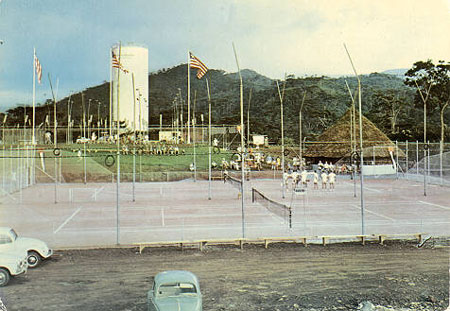
Early in 1986 the rogues strike again. We were at a party, a guy from the Philippines is roasting a pig in a friend's garden, a newly dug pit has been lined with hot cinders, the pig has been wrapped in palm leaves and left to cook in the pit. It tasted succulent, we had a good night. On returning home the rear door is open, Friskey is going bonkers, there are goods on the floor. They must have left in a hurry, nothing has been taken, the front double doors were chained, so the young boy would have to leave by the rear. No way was he going to get by the dog by trying to leave that way.
On a trip back from Buchanan with train 18 its all normal as far as Tokadeh. On leaving Saniquelle dispatcher Dave Ridley tells me the switches at Tokadeh are set for inside, so I can carry on through the sidings and out the other side, which saves stopping twice to reset the switches. Its around 4am as we approach Tokadeh and go inside and pass by the ore bins track. By the road crossing at Tokadeh there is a wooden quay next to the track for unloading supplies. When passing by the quay with the first locomotive, I see a tie sticking out foul, but its too late, the locomotive hits the tie and puts a big gash in the fuel tank. The quay was made out of railway ties and has taken a bit of a battering. With fuel gushing from the rupture, the train is stopped and I step out on to the quay to inspect the damage. Which proves not to be a smart move as the quay starts to disintegrate, with ties falling all around me, all in all its a lucky escape, only damage is to the fuel tank.
The dispatcher is informed of the accident, he apologizes and tells me there was an incident there earlier before his shift, a work train with something sticking out of one of the cars had hit the quay. Fuel is now all over the ground, I get back on the locomotive and draw slowly forward with a trainman keeping a lookout from the second locomotive, in case we hit something else. But we clear the scene without further problems and off we go. I forget how much fuel a HG holds but I know its a substantial amount, all the way to Nimba is a trail of fuel. Back at the depot we finally tie the locomotives down on the workshop. The trainman and brake testers find an empty drum and salvage fuel for themselves. In the tower I meet the dispatcher, he apologizes again. No more said.
Ironically, after Peter Fletcher had gone another lad from Preston, Kevin Mitchell moved in to his old house, close to ours, his father-in-law was a driver from Lostock Hall and later Southport. I meet this driver at a later date. Peter had owned a green monkey named Archimedes, and a dog called Montgomery, but Kevin owned a monkey. One night my wife and I were watching a movie, the only TV broadcast we could receive was from the Ivory Coast, in French of course, so everyone had video recorders. The door suddenly opens and Charlie the chimp walks in, he sits down next to us on the settee, and starts watching TV. I knew this was not going to last long so I got on the phone to Kevin, Charlie was kept in a cage outside house but escaped quite often, but this was a first for us!
He soon got fed up and grabbed my cigarettes and ran into the kitchen. I made him give them back, what was left of them anyway, my wife had contacted Kevin in the pool bar. Charlie had spotted some bananas in the store room, he sat down peeling them, quite happy now. Kevin arrived and collected him. We had a few banana plants in the garden as well as an avocado and mango tree.
There were also weaver birds in the tree, amazing how they make their nests, I used to sit and watch. We had a small black and white bird in the tree, made a nest, then it laid eggs. I was looking forward to see the young birds fly. Unfortunately they never got the chance, the houseboy ate the eggs, what to do? While mentioning fruit, outside the railroad tower were local women who sold oranges, well they were all green, never saw an orange orange in Liberia. They would peel the skin off, leave pith, slice top, you could then squeeze all the juice out, very refreshing. I never saw Liberians chewing gum, but one day saw the Gibley yard boy was chewing, I asked him for some gum, he said it was elephant fat, he had just returned off leave from Grand Gebah County, his home where they had elephants.
Frisky the dog usually was walked just before dusk, on the walk not far from the house stood a Swedish church constructed out of wood, beautiful building. I'm standing having a smoke with the dog running about when he stops by a clump of elephant grass. He's busy sniffing, attracted by something and stays there. I look over and all of a sudden a small black deer runs towards me, about the size of a small dog, runs right past me with the dog in hot pursuit! There is some thick bush behind the church into which the deer quickly vanishes, leaving the dog in bewilderment, strange to think there are wild animals so close to the house.
My wife goes home earlier this year to buy another house and sort the kids out. More people have let the community contracts expire, if you want a house in area F on the hill overlooking the area you can move to one. The second houseboy is very good, very loyal, he even cooks my breakfast for me, the bacon we have is American thin strips. In fact a great deal of the cold store food is from the USA, Post cereal, Tang orange etc. The Lebanese guy in the cold store told me once they used to sell fine spirit, raw alcohol, they were selling gallons of the stuff, then they found out the Swedes were all making there own booze. Then they put the price up.
About this time I'm working back from Buchanan late on a Saturday afternoon with train 16 with a load of 90 cars. Approaching Gaye Peter Town I'm told by Ivor the engine that we're going on to the passing track to wait for a train headed for Buchanan. This station was always busy with a rubber plantation close by and a well worn path across the track. I had a bad experience at this station a few years before, I was told to take it easy on the main track because two trollies were approaching and would be cleared through the passing track. I slowed down as the trollies went into the clear, I started to open up but the trolley driver comes on the radio and says a guy fell under the wheels when climbing between the cars on the move. He said he's not dead but has lost his legs, he tells me to keep going, the trolley crew will take him to hospital. John Nuiymen our Liberian dispatcher says keep going, Malcolm Arbu the trolley driver will take him to Buchanan for medical help. Bit of a shock to say the least.
Back to the story, we're going down the passing track with a big party underway judging by the night fires, dancing, drinking etc, I can't remember who the trainman was. We stop on the passing track, the dispatcher says it'll be twenty minutes. The trainman says this is a bad place to stop, I remember saying you're right! The loaded train passes, the signal clears and off we go, we just get the front of the train out on to the main track when the brakes come on. I inform Ivor and send the trainman back down the train. We know someone has deliberately interfered with the wagon brakes somewhere on the train. The trainman is not keen on going back, but knows he has to. I give him the radio and flashlight. He has to check the cars in the dark and find which brake cocks are closed or have pipes uncoupled. Finally he comes on radio, cocks had been closed, the reset made and the brake pipe pressure starts to rise. I tell him to climb in car and I will try to get away. I report to Ivor that train 16 is now ready to start, he says push the train back onto the passing track, I have another loaded train on the way down. I cannot believe what he's saying and tell him the only direction I'm going is forwards. He says you're to push train back, I say I'm not. Loggerheads. In the end I tell him I consider what he's telling me to do is very dangerous. And I'll stand here until he gives me permission to go forward. Ivor was always on another wavelength to everybody else. In the end he let me go. Further down the line we stop and allow the trainman to come back up to the locomotives. Nothing was ever said.
During June its back home on a British Caledonian DC10, returning with the wife on another DC10. Much of our leisure time is spent up at the golf club, which is where I sighted my first plantain eater, a colourful large bird, I had given up on seeing the colourful roller. Whilst I was locomotive switcher at the workshops, I spotted one sitting on some ties, a bit dirty looking, but the colours on this bird were magnificent.
The Dutch guys doing the rewiring job have settled in, they are at all the company functions, really enjoying themselves. With Christmas approaching we have booked a ticket for our daughter to come out. I manage to get the job of 'driving' the railbus, that is, being in charge of the railbus because now locomotive 401 is used to pull the railbus down and return. I am with the railbus to oversee the running of the engines to provide for the auxiliaries, there is no air pipe so we are loose coupled.
With my daughter's flight arriving late in the afternoon, I decide to go down to the airport. I get Lamco transport to the airport, whilst waiting around I get a little weary of being hassled so decide to go through to arrivals. Don't ask me how I managed this but no one stopped me. I watch the plane land and when my daughter steps out of plane I'm at bottom of stairs on the tarmac waiting to greet her, first thing she says is how did you get here? Then its back to Buchanan, and we're ready to depart, the railroad superintendent is riding on the railbus. Its a strange sensation being towed back to Nimba, sad really. I can't recollect whether the railbus was used again.
This year's Christmas and New Year festivities were excellent. After the New Year we were asked if we wanted to move up to area F on the hill, since more people had gone. The holiday season also meant the arrival of the dust storms from the Sahara, this year they arrived on December 7th. Goats became the victim of train 22 at km 132 on December 15th.
![]()
1987
On January 6th we stop at Bakhoen station, Franklin Smith is the trainman. We get off and go down to the village for oranges. There is a small group of huts surrounded by a variety of trees, a bread fruit tree, mango tree, lemon tree, three orange trees and three grapefruit trees along with cocoa and coffee bushes. The villagers let us have whatever we wanted. Other observations from the first few months in 1987 include:
A stowaway is found on the locomotive of Train 21 on January 22nd. After quite a while a deer is spotted in Buchanan yard, it did not move as we passed by.
February 28th Weaver birds started making nests in the tree next to the house. Now its raining almost every evening.
March 1st is the second of two nights when the termites emerged from their hills, but not as many as last year.
During the same week on March 6th a hunter passes the house carrying a large deer, further down line at km 193 we spot another large deer. Also at this time the soldiers are going around the villages trying to deter stowaways from travelling on the trains.
Another civet cat goes under the wheels of the train, this time its at km 40 with train 11 on April 18th.
Very warm weather is recorded on April 28th, the insects are very active, being bitten regularly whilst out on the line, a rhino beetle crashes into the cab window but survives the impact and drops onto the nose.
The Dutch re-wiring crew appear to have finished their job and gone home. We move up to area F, the wife wishes to be near her friend, Mrs Lewis. To me the house we left was a lot better, but we were now on the hill. Area F was mainly for management, supervisors, etc, also a lot of dead wood, people who had been there a long time, and sneaked in the back door. The houses were older and very close to the bush, therefore more wildlife to worry about! One of the S & T guys finds a baby freshwater crocodile in his pool, we did not know they were there. The African grey parrot we've had for a year is now getting more friendly.
Despite having now lived in Yekepa for seven years I had never been down to the nearby stables, until now that is, when I was asked to go down there and assist with a dead horse! The stables were neat and well kept, they had an impressive fence jumping arena. I was part of a group of guys that assisted in rolling the horse's body onto a canvas, very heavy. A sad day for all the members of riding school. Hopefully when they finally buried the horse they used some plant machinery to do the digging, not like Ron and I with Sheba!
We were looking forward to our trip home, with direct out and back flights booked on British Caledonian DC10s. There was no talk of finishing when leaving for our break. Mind you with two kids living in the new house things were getting more challenging, I did not know the neighbours, and when one of my son's mates had somersaulted through the window into garden, I was not very happy. This would also be the last time out for our youngest son. He would soon have to stay home, my mum and dad had done a good job monitoring the kids, but you could see it was becoming a problem. Before leaving we give them the usual warnings!
Upon our return we were told that there were only going to be two trains a day down the line, only four enginemen were to remain, they had the two Liberian enginemen. The decision was to keep three of the last enginemen out and Dennis from Toton. The rest would be made redundant, it was similar at the mine with only a skeleton crew left, even whilst we were on vacation some had already gone. The prospects for the future of the company did not look very bright. Whatever the prospects it was obvious that decisions were now being made for us, we probably would have stayed another year against our better judgement, or I would have ended up out alone, who knows.
During July we celebrated Dave Lewis's fortieth birthday party, a big party, with a good size crowd present, everyone enjoyed themselves. Although probably not realising it at the time this would be the last time most of us would be together. A group of us who were all leaving together thought it would be a good idea to call in at the Gambia on the way home and relax for a week, we had passed through Banjul so often it seemed like a good idea.
By the time August came around we were busy making preparations to leave. There was paperwork to be sorted out, a shipping box needed to be ordered, some guys were going down to the wood yard to have their wooden leaving box dressed, the wood was good quality. Items that were not being shipped back to the UK needed to be sold. I was able to sell the car for $500, the exact price I'd bought it for seven and a half years earlier! Also sold were such items as the video, hi fi set, TV etc. The houseboy could have all of the sundry items, which had amassed to quite a collection. The trainmen had asked for certain things which I passed on to them. Also taken care of was the airline tickets through British Caledonian and the hotel reservations for the group's stay in Gambia. The group consisted of Dave Lewis and family, Colin from the workshop and his family, Ron, and a Scots guy from the mine, Tom and of course my family. Fourteen in all.
In recognition of the group that were leaving the trainmen organised a leaving party, which took place in Stanley's bakery in area P, of course we gave them the money to buy the food and drink. The day of the leaving party arrives, its only for the enginemen who meet in the bakery, the boys have dressed the place up with palm leaves all over. Eight enginemen are leaving, they are all presented with a wooden plaque of the counties in Liberia, a nice gesture, although why they burnt our initials into it they only know. Ron is made a paramount chief, an honour only bestowed upon a few people, they call it gowning, we all had an enjoyable time. I suppose looking back if you had been out there for five or more years it would have been worthwhile.
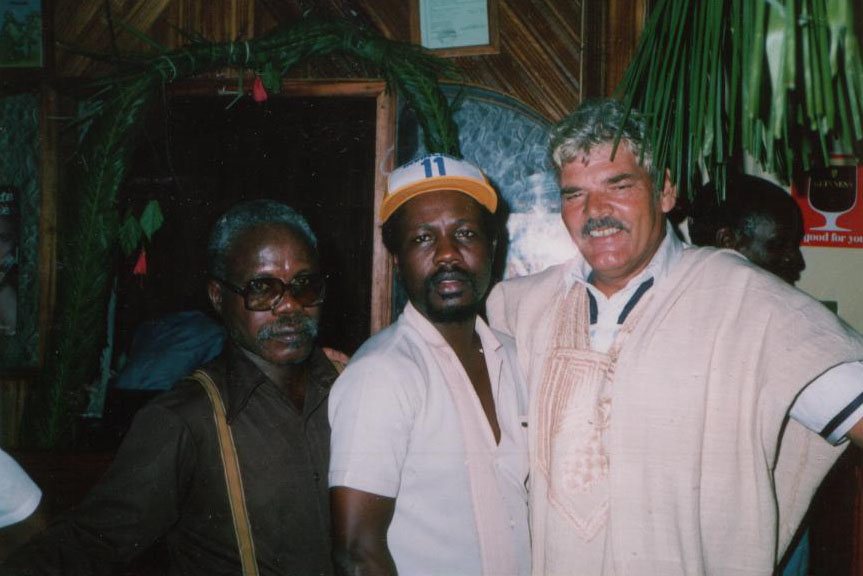
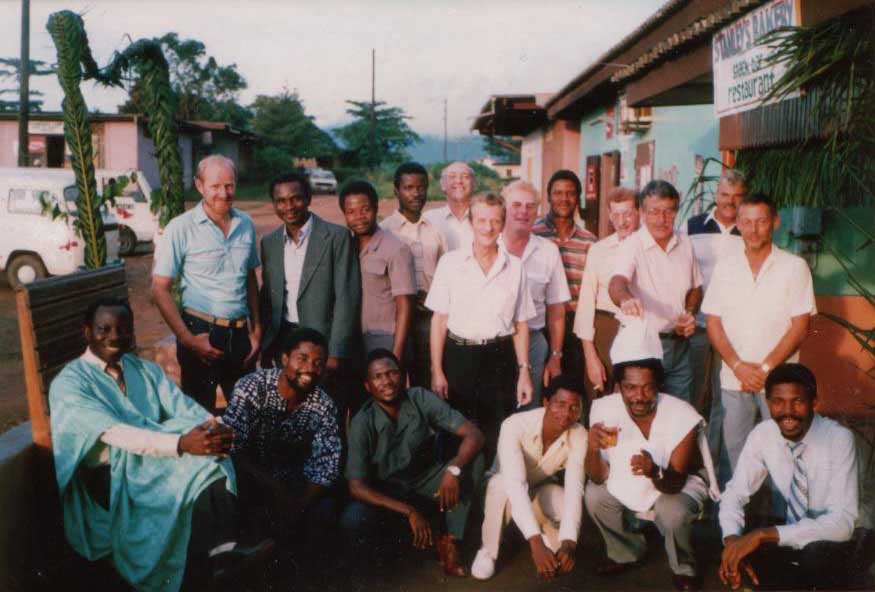

One signal and telegraph guy was staying so he had wanted Friskey, so the dog would be cared for. I can't really say it was a sad day, maybe because the majority of the workers were leaving all at one time. I think the ones staying knew it was never going to be the same.
I found out from one of the dispatchers that the two trains a day were going to consist of 120 cars each.
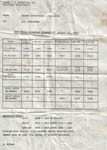 |
The train schedule for the workings from August 17th 1987. Courtesy Mal. |
With all our business sorted out and our goodbye's over we depart Yekepa. A DC10 takes the group to Banjul, stopping en-route at Lungi Airport, Sierra Leone, while we're waiting there Dave Lewis tells me a story. In the early years a group of engine mechanics working at the mine were stopped at the same airport. A small portable engine was used to provide auxiliary power for the airplanes parked at the terminal, which this day has broken down. The airport staff have not been able to fix it, howevever the flight crew knew that LAMCO personel were on the flight and asked if they could look at the machine. They step off the plane, roll up their sleeves up and soon have the machine fixed, they said they had done it to get home quicker!
Our flight to Banjul is without incident, then its a taxi ride to our hotel. Our hotel is a nice one - The Atlantic Beach, four stars and definately good enough for us. It is situated right on the beach so we start to unwind right away. The food is good, the people are friendly, the hotel is used by British Caledonian crews when on stopover. At the palava hut by the pool the first thing I noticed were the flies, once you took a sip of your drink these things would swoop down, blue, green, yellow bottles, plus other kinds. The barman would put beer mats over your glass to keep them out. I did not see as many as this in Liberia, even in Buchanan. We had to laugh at Ron, he loved his music - all oldies, he had his portable player with him by the pool, playing Doris Day, Sinatra and Martin tracks, people would look across but Ron couldn't care less!
The time went fast and on August 18th 1987 we make our way back to the airport. We get there to find the small facility a scene of chaos. We could get nowhere near to the booking-in desk. On the tarmac is an Air Italia jet, we were told it was a charter to Mecca, though we could still not understand why there was little movement toward the desk. Then without warning we are told our flight was full, so much for holding booked tickets, but in Africa they count for nothing. This doesn't however stop Ron, he shouts to us I'm getting through, their putting me in Club Class, an upgrade. After Ron had gone through, the desk was closed, what to do? Very soon the plane is taxiing out onto the runway. A manager gets us taxis back to the hotel, where we book back in. We find out later that there are others in the same predicament because of the overbooked flight. We settled in at the hotel again, the manager gave us the address of the local British Caledonian office, we would go there the next day.
Back at the hotel we all meet up to discuss our options, we now have no suitcases, they had gone before us to the airport and were now en-route to Gatwick! We had only our hand luggage, thank goodness our family always put a change of clothes in our carry on bags, for a situation like this. We decided a couple would go down to the British Caledonian office and find out what they were going to do. Not sure who went into town, but on meeting the manager he said no cause for alarm, I can get you out tonight on a short flight to Dakar, and then get you booked on a connecting flight to Paris. You would be home by late tomorrow, it all sounded so straightforward, so easy.
At the hotel our group discuss these possible travel plans, the hotel manager will call the British Caledonian manager with the outcome, the tickets are to be sent to the hotel with transport, and also an Air Gambia representative who will travel with us. Dave's eldest son Andrew was running a temperature, so the thought was best get home as soon as we can, so the decision was made to go. The transport, tickets, and Air Gambia representative arrived to pick us up, so off to the airport yet again. This time the airport is almost empty, our plane is an elderly looking Air Ghana DC9 and is waiting on the tarmac. We checked in, boarded the plane, strapped in and we were off, only a few people are on this flight. We put our hand luggage in overhead lockers which have no doors! The flight was fast, first time I have flown almost sideways coming into Dakar. So far so good. After we had disembarked from the plane, our Air Gambia representative took us to the Air Afrique desk, where there is a big queue, he finally was able to talk with one of their people, who told him we have no chance of getting on the flight that night, its already overbooked!
Now whether or not the British Caledonian manager had contacted them we had no way of knowing, our group now consisted of about twenty three people all in the same predicament. We gathered around to discuss our next move. Included in the group was a professor from Oxford or Cambridge who had travelled up the Gambia river collecting specimens of some sort, these were with him in cool boxes, he was very concerned. Also some business men and a German girl, and a few others, the details now forgotten. They were able to get use of a telex machine and contacted British Caledonian. At first we were told they may divert a flight from Zambia to pick us up, but no guarantee, as time went by the kids were getting tired, the Air Gambia representative took us to the airport hotel, in an attempt to allow us to spend the night in a little comfort. Unfortunately it was a flea pit, we examined the rooms, the windows were open, soiled beds, unclean rooms, we went straight back to the representative and told him what we thought, there was a heated argument with the representative, at one point I thought Dave Lewis was going to punch him, Andrew was in a much worse state now, looked like malaria.
We went to the refreshment room, the representative bought us some soft drinks, we had no CFA Francs, I think a bottle of water was £3. As time went on into the night the next flight out was going to Tunisia, I think this was also full. At this time I had made up my mind I was going to the Meridian hotel where we had stayed in 1982, the rest of the group agreed so off we went. We all booked into the hotel, had a meal and went to our rooms shattered, Andrew got some medication. After a good sleep, we meet by the pool bar. It is now August 20th, we have a good meal and are just lounging around, later that evening we're told to go to the airport, we may get on a flight! The women and children remain at the hotel, we can call them if we're successful, all these African airports are chaotic with people wandering aimlessly about, many of them apparently not going anywhere. Tom and the German girl manage to get on a flight, finding single seats is a little easier. We make our way back to the hotel, most of the others have got out, our families are the last.
August 21st things are more settled, we obviously want to get home but are able to enjoy the amenities a little more, the kids swimming etc, most people in the hotel are French, we manage to communicate, early evening we book a table down by the waters edge, al a carte menu, we all order the best food and wine. The majority of the people in Senegal are wolof, very tall people, we have one by us playing a gora, a long stringed instrument with the base made from gourd, sounded quite good. It is a beautiful setting with a cool breeze, we're just finishing our meal when reality returns with a message to go to airport, we'll be flying out that night. On leaving the hotel for which British Caledonian were paying the bill, the desk asked for money to cover the drinks, I told them to put it down to the laundry bill!
We all make ready for the trip to the airport, the mood has changed - we're taken to a private lounge, every one is being very nice, what drinks do you want, cool cloths to wipe your face. We are told we're flying an Air Afrique DC 10 to Paris Charles De Gaulle, then their agent says to the group, Mr & Mrs Caine your flying Club Class, Mr & Mrs Lewis you're also Club Class, Mr & Mrs Pratt (I still smile even now when I see Dave's face), your flying First Class, I suppose because we only had one son aged fourteen that was the reason. On boarding the plane we are escorted personally to our seats, they are like those big all leather barbers seats. We each get a toilet bag, a bit classier than the one you usually get, now properly situated we settle down. There are two stewardesses in traditional African dress to look after us, two toilets with all the toiletries you could wish for, very relaxing with only six people in the cabin. We take off into the night, smoked salmon is served with all the trimmings, best wine, my son is guzzling the wine down, we extend our seats back into beds and fall asleep. The next thing I remember we are in Bordeaux, it's still dark but sunrise is near. We freshen up ready for disembarking at Paris.
We arrive in Paris not knowing what to expect, we are met by British Caledonian staff who take us to their offices on the other side of the airport. I must say we did look bedraggled. They ask if there's anything we require, everyone is aware about our plight. They tell us we're booked on a business men's flight to Gatwick in Club Class. We have a newish plane, a BAC 111 for the short flight. After take off we are given a newspaper, strawberries and cream, generally made a fuss of on the journey. At Gatwick we are met by a very apologetic senior manager, he provides us an address to write to contact them. Outside three limousines are waiting for us, Mr & Mrs Lewis & family are off to Swansea direct, Mr & Mrs Caine off to Newcastle direct, and Mr & Mrs Pratt off to Liverpool direct. We now go our separate way, we slept most of the way home, by now its Saturday August 22nd - it took a long time getting home!
After the incident I suggested to British Caledonian that they pay me in MCOs, I took their third offer which amounted to four return tickets to the USA. The MCOs get used in November 1988, we ended up going to Florida, renting a car, to Daytona, rest, then to Memphis, over the Smokey mountains, and on to Graceland. We drive back through Mississippi, Alabama, and the Gulf side of Florida, Ron came with us, we lost him twice on the journey, lucky to find him again.
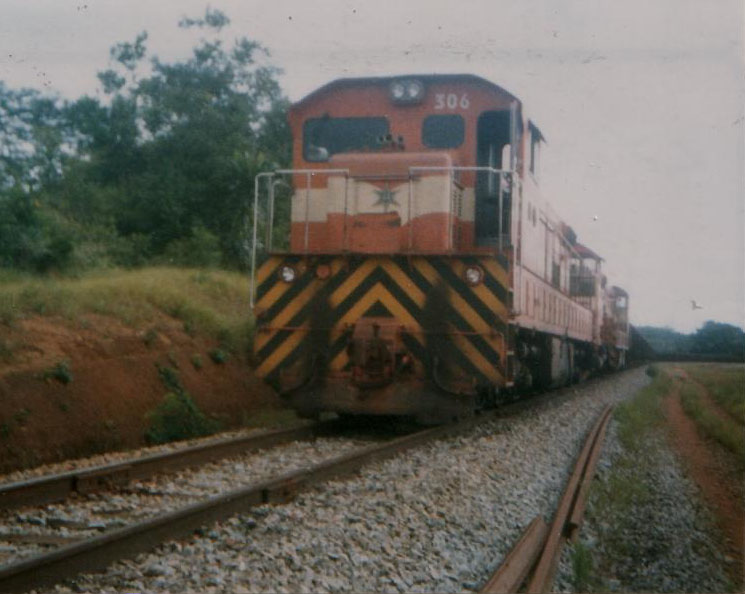
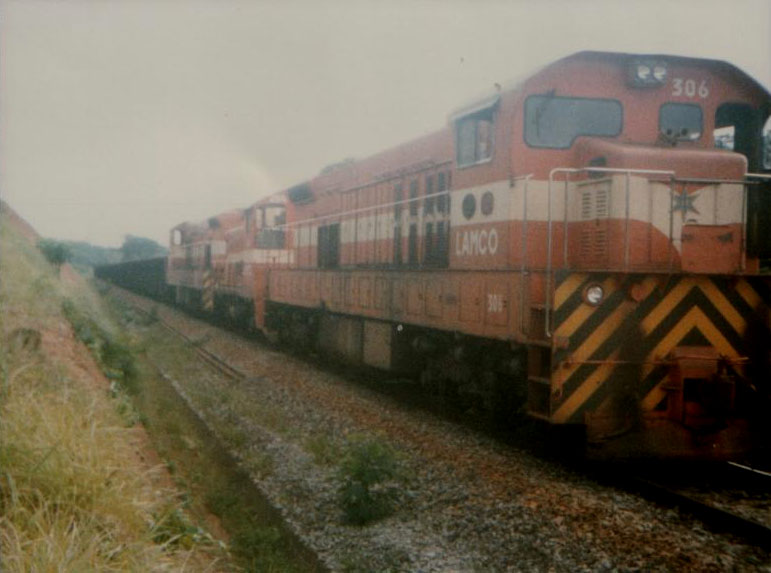
![]()
The LAMCO railroad was built by Raymond International who brought in four GE 44 tonners and six Alco RS2s. It seems that the four GE's remained in Liberia after the construction was finished.
Raymond International Locomotives
(GE 44 tonner information compiled by Nate Beyea.)
The four General Electric 44 ton locomotives used by Raymond International were all acquired from the Claremont & Concord Railway, based in New Hampshire, USA. The four locomotives received Raymond International numbers 4401/02/03/04 and their light blue livery with white stripe before leaving the Claremont shops for Liberia.
RAYMOND #4401
Builder Number: 13093
Build Date: 6/1941
Railroads Served:
(1) Boston & Maine #115
(2) International Railway Equipment #115, 2/1958
(3) Claremont & Concord #30 (1st), 2Q 1959
(4) Montpelier & Barre #30, 4/1960
(5) Raymond International #4401, 9/1961, for service in Liberia (Africa)
RAYMOND #4402
Builder Number: 15130
Builder Date: 9/1942
Railroads Served:
(1) Denver & Rio Grande Western #43
(2) Hoosac Tunnel & Wilmington #15 (1st), 6/28/1949
(3) Saratoga & Schuylerville #15, 1Q 1953
(4) Hoosac Tunnel & Wilmington #15 (1st), 3Q 1954
(5) Saratoga & Schuylerville #15, 2Q 1957, for line scrapping operations
(6) Claremont & Concord #15, 4Q 1957
(7) Raymond International #4402, 9/1961, for service in Liberia (Africa)
RAYMOND #4403
Builder Number: 12943
Build Date: 11/1940
Railroads Served:
(1) Boston & Maine #113
(2) Claremont & Concord #13, 12/1954
(3) Raymond International #4403, 9/1961, for service in Liberia (Africa)
RAYMOND #4404
Builder Number: 13094
Build Date: 7/1941
Railroads Served:
(1) Boston & Maine #116
(2) Sanford & Eastern RR #14 (2nd), 11/1957
(3) Claremont & Concord #14, 2Q 1961
(4) Raymond International #4404, 9/1961, for service in Liberia (Africa)
Other LAMCO rolling stock (incomplete at this time):
Locomotives
LAMCO 101 - 103: shunters Z43 class, built by Kalmar Verkstad AB, Sweden with c/n's 200 - 202 of 1961
LAMCO 101 - 105: ex British Railways 350hp Class 08 shunters, refurbished Derby 1973 & delivered 1974.
LAMCO 201 - 205: new EMD SW900 serials 26774 - 26778 9/62
LAMCO 301 - 310: new HG 16 serials 30614 - 30623 1962 built by Henschel
LAMCO 311 - 313: new HG 16 serials 30999 - 31001 1966 built by Henschel
LAMCO 314: new HG 16 serial 31467 built by Henschel
LAMCO 315 & 316: ex UP 454/459 (reported also as 456/457) ex UP SD7's, to PNC and rebuilt as SD10's, shipped 3/80.
LAMCO 401 & 402: ex NH 1205/1215 GP9's
Railcars:
Swedish SJ YBo6 Class obtained used from the Göteborg-Särö Järnväg (GSJ) which closed in the mid 1960's & purchased by LAMCO
Diesel mechanical, Scania Vabis D815 engine, Wilson R11B transmission.
Other types of Swedish railcars also reported in use by LAMCO.
ex British Railways 79091, 79093, 79094, 79096 & 79097: (withdrawn from BR 10/72, refurbished Glasgow)
Diesel mechanical, two BUT (AEC) 6cyl 150hp engines.
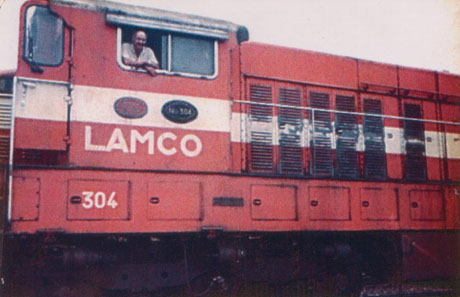
Renumbering / Disposition:
LAMCO 101 - 105: ex British Railways 350hp Class 08 shunters:
101 - D3092 saw regular service into 1986, last recorded use (as emergency reserve) on February 23rd 1987
102 - D3094 last used June 14th 1980
103 - D3098 last used in 1979
104 - D3100 last used March 14th 1982
105 - D3047 last used November 27th 1981
It is believed that D3094, D3098 & D3100 were scrapped during 1986.
The original LAMCO fleet established when the line was opened in 1962 was comprised of five SW900s and 13 HG16s. The opening of the mine at Tokadeh during 1973, about ten miles south west of Nimba was the reason for the purchase of the ex-British Railways Class 08s in 1974/75. The mine at Tokadeh had a challenging history, closing prematurely and making the Class 08s redundant. Two were retained at Nimba as back-ups to the SW900s whilst the other three were retained for spares. Two of the Class 08s also worked at the port facility at Buchanan to release SW900s to mainline duties. But as the volumes of iron ore shipped decreased the Class 08s were the first to be sidelined. Tokadeh would reopen in 1986 but with all the switching/shunting done by the train locomotives. A 14th Henschel HG16 was purchased in 1970, whilst a decade later four remaunfactured locomotives from the USA were delivered in 1979/80 - these were the two SD7s and two GP9s, which were classified as SD10 & GP10 following their rebuilds. Operation of the iron ore trains required at least two of the Henschels with a third locomotive, either another Henschel, an SW900 or one of the later rebuilds after their delivery in 1979/80.
Following the unreliability of the ex-BR Class 126 diesel multiple units during the early 1980s, from March 1984 a GP10 locomotive hauled the diesel multiple unit when a trip was made from Nimba to Buchanan.
![]()
When Mal left in the summer of 1987 it appeared that although the production at the mine had been reduced there was still going to be a need for the production of iron ore here for many years to come, which included the continued use of the railway to allow for its export. As mentioned elsewhere Liberia would shortly become embroiled in a civil war that would claim many of the industries that had provided economic support to the country for many years.
When the mine facilities and railway were abandoned the physical plant was left behind to await the ravages of time and civil disorder.
The picture below is used purely as a conclusion to the first cut of this article. I do not know who took the photographs and sincerely apologise for not being able to provide proper credit to the photographer. I hope that the use of the photograph is acceptable, but if proper credit for the view can be established, it will be immediately given. More recent views of the abandoned rail facilities at Nimba can be found further down this page.
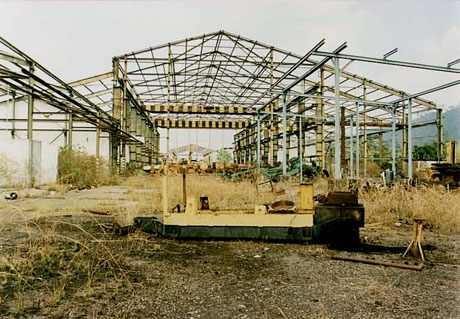
![]()
Iron Ore mining in Liberia
The mining of iron ore in Liberia developed shortly after the end of World War Two, initially to the north of the capital, Monrovia in the Bomi Hills and then later in the Bong Range. Four companies were involved in the ore extraction and it was the Liberian American Swedish Minerals Company that established iron ore extraction facilities on the eastern side of the country near the borders of Guinea & the Ivory Coast, a location in Liberia which was about as far as you could get from the Atlantic coast!
The companies involved, in order of establishing ore extraction were:
Liberia Mining Company (LMC)
First to begin mining (1951) iron ore, 68km north of Monrovia, 66% ore content in Bomi Hills
Liberia receives 50% of net profits
National Iron Ore Company (NIOC)
Second, on the Mano River 64km from the Bomi hills, 54% ore content
Liberian owns 50% shares in NIOC
Liberian American Swedish Minerals Company (LAMCO)
Managed by Granges Company of Sweden, Bethlehem Steel held 25% share of LAMCO
Site opened 1963 and since 1973 at Tokadeh 40km away
Nimba 65% ore content, Tokadeh 40 - 55% ore content
Buchanan has pelletising plant with 2.2 million ton capacity.
Investment US$285 million to 1972, Liberia owns 50% shares in LAMCO
German Liberian Mining Company (DELIMCO)
Fourth, in Bong Range 80km east of Monrovia, 37% ore content
Investment US$126 million, Liberia receives 50% of net profits.
LAMCO was granted its concession in 1953, deposits of iron ore were discovered in 1955/1956, with proven deposits of at least 250 million tonnes confirmed during 1957. The ore assayed at an average of 65% iron content, located near the borders of Liberia, Guinea & Ivory Coast, about 170km from the port of Buchanan and at an elevation of 1,500 metres above sea level. Shipping of the ore did not begin until April 19th 1963 following completion of the facilities at the port of Buchanan. The mine at Nimba had a capacity of about 12 million tons annually. When European and American demands for the ore declined in the late 1970's Nimba's output dropped to about 9 million tons.
By 1983 production had fallen to 6.6 million tons, with the company reporting losses. Despite the reduced amount of ore shipped it still accounted for one half of Liberia's iron ore exports. As with the employment of expatriates globally their costs were high, in Liberia they represented a tenth of the total labour force but received half the total wage bill of that country's mining operations. As at 1984 LAMCO remained a joint venture that accounted for about half of Liberia's annual iron ore output. Seventy-five percent of the company was owned by a consortium, the government held a 50% interest; a Swedish consortium held 37.5%; and Liberian and foreign private interests held 12.5% percent. The remaining 25% was owned by the Bethlehem Steel Company of the United States, but in June 1984 this holding was acquired by the Liberian government, although Bethlehem Steel committed to buy 2 million tons of iron ore annually for the following three years.
Of additional concern for LAMCO was that the Nimba ore deposit was nearing depletion. The possibility of opening up a new concession would require a huge investment of about $300 million - which was not forthcoming at the time. Another option was to use the existing railway line to Buchanan to provide access to the undeveloped ore deposits across the border in nearby Guinea.
The end for iron ore production came not because the ore deposits being worked out but because of the civil war that overwhelmed the country. Production was abandoned in 1992 and LAMCO surrendered their concession.
For over a decade the mine and facilities at Nimba and the railway line down to Buchanan were left to the ravages of nature, vandals and looters. However all was not lost as world demand for iron ore saw companies taking a look at alternative sources for extraction and this including re-evaluating the deposits remaining in Liberia. Several mining concerns showed interest in returning to Liberia to restart mining operations. In particular the firm of Luxembourg based ArcelorMittal showed great interest in the ore facilities at Nimba to the extent that in 2006 agreements were signed to restart mining operations, including the opening of the railway. Investment was expected to be in the region of $1.5 billion in Liberia, to the extent that the Nimba facilities would reopen in 2009.
![]()
June 2010 Update
Notes (from a larger article) provided by Peter Nettleship.
The international financial crisis forced the original plans of ArcelorMittal to be delayed, with the timetable revised to reopen both the railway and the mines completely in 2011. Despite the years of neglect the railway was in better shape than had been thought. The basic infrastructure was all still there; all bridges were in good order and nearly all the track intact. Re-sleepering is one of the major projects and is progressing well, at least to kilometer 96 at the date of this report. Further north, one sleeper in four or five is in place to allow the operation of light works trains where needed.
At the east end of the line, at Yekepa, the abandoned railway workshops still hold the hulks of the locomotives and rolling stock which once worked the trains. One of the locomotives still shows the bullet holes from a rebel ambush during the civil war. The remains of the workshops reveal that the workers left in a hurry, a set of wheels still sit on the wheel-turning lathe, with many others signs of unfinished tasks. In the yard is a British-built 90 tonne diesel crane, by Cowans and Sheldon of Carlisle, as well as the inevitable Matisa ballast tamper and other permanent way equipment. It must be presumed that once the line is opened up to Yekepa a scrap drive will clear the area of all the derelict equipment. It is the intention to reuse the iron ore wagon bodies by fitting new underframes. Additionally the Railway Superintendent in Yekepa, Thomas Davies spoke highly of the Timken roller-bearing axleboxes on the wagon's bogies, suggesting that some might still be useable despite not having turned a wheel for fifteen years.
Project Director (Railways and Port) Ross Lockerbie was confident that the project would be ready on schedule in June next year. By and large on the upgrade of the line, the heavy-duty 132lb rails of the original line can be re-used, but new sleepers and ballast will be needed throughout. For the engineering works, the Brazilian contractors, Odebrecht, are using road-rail vehicles – one can move a few ballast wagons, while the other two are converted Toyota Land Cruisers. Recent arrivals in Buchanan are two elderly diesel shunters of about 500hp, bought second hand from Romania and (to quote a very senior official) only fit for a museum. These are identified as Faur built LDH 195-125 and LDH 125-472, and carrying a plate (apparently from an agent) labelled Daxi SA.
The line runs north-east from Buchanan to Yekepa, generally fairly straight and easily graded, through open scrubland which gradually gets more wooded and hilly as it gets closer to the magnificent vista of the Nimba Mountains. A trip along the line, regrettably by Land Cruiser on the parallel road, showed much work had already been done. Light trains can go right through already and, half way up, a new quarry is being opened to provide ballast.
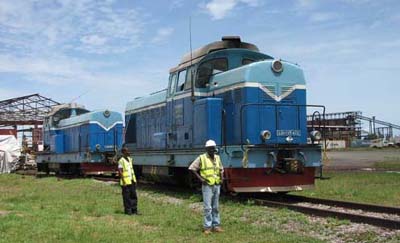
New 4,400 hp locomotives are already on order from General Electric in either Canada or the United States, with delivery expected in January 2011. A lot of work remains to be done between now and then. But it’s proceeding apace: The new quarry is at Greenhill, about Km 150 and will provide enough ballast for the whole line: An impressive prefabricated village has been erected there for an expected staff of more than 30, with housing, canteen, generators, clinic and so on. It was due to open for business sometime in July this year.
As at June 2010 Yekepa town has a population of about 4,000 people, of whom roughly a third are ArcelorMittal employees and their dependents, although, of course, many more benefit from the company indirectly. As well as the jobs it already provides, with the promise of more to come as the mines start up, ArcelorMittal has built a school, a hospital and a youth club, primarily for its own and contractors’ staff and their families, but also available for a nominal fee to other locals. This is all in their agreement with the Liberian government. The company also keeps in close liaison with the local elders to avoid misunderstandings and misconceptions. Some of the original Lamco housing has been renovated, but it is clear it won’t provide the complete company town, and cradle-to-grave welfare that Lamco built up there. So restoration of the golf course, and the famous Olympic-sized swimming pool right on the Guinea border, remain near the bottom of their list of priorities.
2010 Views
December 2011 Update & Views
The views below are courtesy of John Middleton, taken on a trip to Liberia late in 2011.
Most pages on this website normally have a connection to Sulzer powered locomotives and whilst it is true that in Mal's time with British Railways they were a big part of his adventures, there was however no apparent connection with the locomotives operating in Liberia. Until the summer of 2008 that is! As part of the huge task facing ArcelorMittal there was a need to find operating locomotives for the Nimba - Buchanan line. Two locomotives initially selected were two of the Roumanian built Faur LDH 150 four axle locomotives. These are believed to be the former LDH 125-195 and LDH 125-472 equipped with the familiar Sulzer 6LDA28 engine.
Liberia Mining Company
LMC 6: new EMD serial 22603 10/56 G8
LMC 7: new EMD serial 22604 10/56 G12
LMC 8: new EMD serial 26210 2/61 G8
Part One of Mal's LAMCO adventures
![]()
Resources:
The Geography of Modern Africa - William A Hance 1975
Daniel Osbourne (roster information)
Brits Abroad - Ken Carr & David Maxey 2009
Rail Express March 1999 'Lost in the Jungle' article
To continue to Mal's British Railways steam and diesel/electric railway memories please click on the links below:
Part One - The Steam Years 1960 - 1968
Part Two - The Diesel/Electric Years 1968 - 1980 & 1989 - ?
Page added December 6th 2008.
Last updated December 13th 2017.
